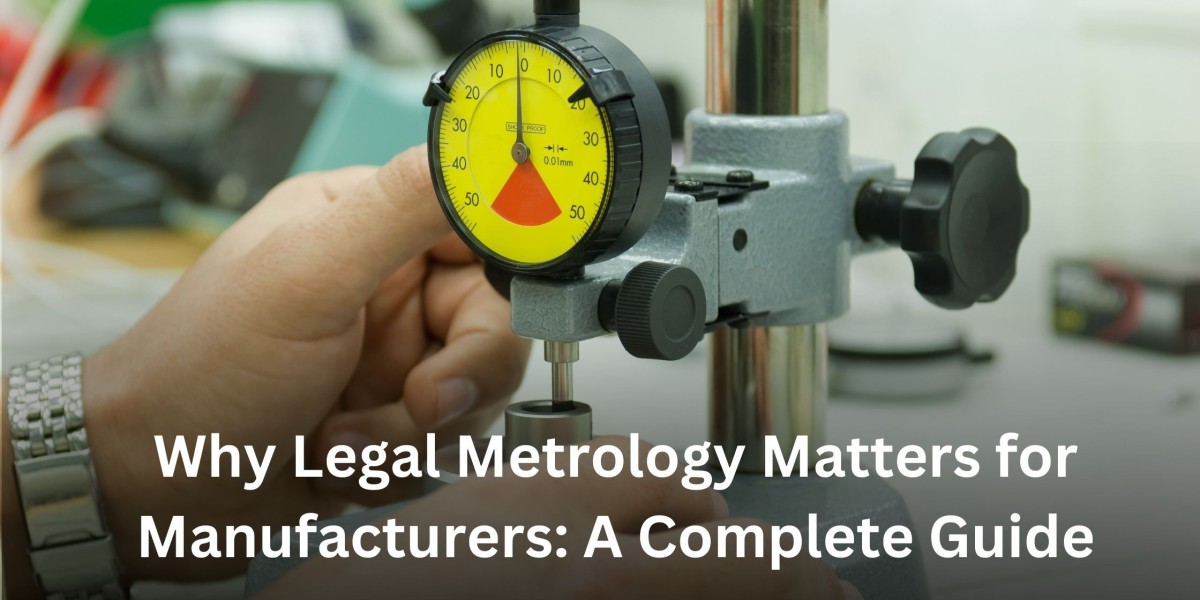Why Legal Metrology Matters for Manufacturers: A Complete Guide
In today’s world, accurate measurements play a crucial role in ensuring fair trade, safety, and transparency. Legal Metrology, the science of weights and measures, regulates these aspects to protect both consumers and businesses. For manufacturers, complying with legal metrology laws is essential to ensure that the products they make and sell are accurate and meet legal standards. This blog will explain why legal metrology matters for manufacturers and why getting the right licenses, like a Legal Metrology Certificate Registration, is critical for your business.
What Is Legal Metrology?
Legal Metrology deals with the regulation of weighing and measuring instruments used in trade, industry, and daily life. It ensures that consumers receive accurate information about the quantity and quality of products. These regulations are critical in industries like manufacturing, where precision in measurements is vital for both product quality and consumer safety.
The Legal Metrology Act in India governs all matters related to weights, measures, and instruments. It ensures that businesses adhere to certain standards and follow correct practices in their weighing and measuring equipment. Any violation of the law can result in penalties, fines, and even a damaged reputation for the business.
Why Does Legal Metrology Matter for Manufacturers?
1. Accurate Measurements Ensure Product Quality
For manufacturers, delivering products with precise measurements is essential. Whether you’re manufacturing packaged food, liquids, or electronics, even a small variation in weight or size can affect product quality. Legal metrology ensures that all products are measured and labeled correctly, preventing any misunderstandings between businesses and customers.
2. Boosts Consumer Trust
When customers know that a manufacturer follows legal metrology rules, they are more likely to trust the brand. This is especially important in highly regulated industries like food, pharmaceuticals, and electronics, where the accuracy of weight and volume can significantly affect product performance or safety.
3. Compliance with the Law
Legal Metrology laws are mandatory in India. Any company that produces, imports, or sells goods by weight or measure must follow these laws. Non-compliance can lead to fines, penalties, and legal complications. Therefore, it is crucial for manufacturers to register for the appropriate licenses, such as the Legal Metrology Manufacturer License Registration, to avoid legal trouble.
4. Fair Competition
Legal metrology ensures that all businesses operate on a level playing field. By standardizing measurements, no company can gain an unfair advantage by misrepresenting the size, quantity, or weight of their products. For manufacturers, this regulation protects against dishonest competitors and ensures a fair marketplace.
5. Prevents Fraud and Protects Consumers
Legal metrology acts as a safeguard against fraud. If products are inaccurately measured, it not only harms consumers but also damages the business’s reputation. By adhering to legal metrology regulations, manufacturers can prevent such issues and maintain a positive brand image.
Legal Metrology Certificate Registration: What You Need to Know
One of the primary requirements for manufacturers is obtaining a Legal Metrology Certificate Registration. This certificate is essential for manufacturers who produce goods measured by weight, volume, or length. It certifies that the business is complying with all the legal metrology laws in India.
Steps for Legal Metrology Certificate Registration:
- Submit an Application – Manufacturers need to submit a detailed application to the Legal Metrology Department in their respective state.
- Provide Necessary Documents – The application should include details like business registration, product information, and manufacturing processes.
- Inspection – An officer from the Legal Metrology Department may inspect your factory or premises to ensure compliance with legal standards.
- Issuance of Certificate – After the inspection, and if all conditions are met, the Legal Metrology Certificate will be issued.
Having this certificate allows manufacturers to sell products with legal verification of their measurements, ensuring trust and credibility in the market.
Legal Metrology Dealer License Registration: For Dealers and Distributors
Apart from manufacturers, businesses that deal in the sale or distribution of weighing and measuring instruments also need to comply with legal metrology regulations. For them, the Legal Metrology Dealer License Registration is essential. This license allows dealers to legally sell or distribute products that are measured by weight or volume.
How to Obtain a Legal Metrology Dealer License:
- Submit Application – Dealers must submit an application to the Legal Metrology Department along with necessary documents like business registration and sales information.
- Verification Process – Similar to manufacturers, the legal metrology officer will inspect the dealer’s business to ensure that the weights and measures they are selling comply with legal standards.
- Issuance of License – Once approved, dealers will receive the Legal Metrology Dealer License, allowing them to operate legally.
Legal Metrology Manufacturer License Registration
If you are a manufacturer producing weighing and measuring instruments like scales, meters, or gauges, you need a Legal Metrology Manufacturer License Registration. This license allows you to manufacture these devices in compliance with legal standards.
Steps to Obtain the Manufacturer License:
- Submit an Application – The manufacturer needs to apply for the license to the state’s Legal Metrology Department.
- Documentation – Required documents include manufacturing details, product descriptions, and technical specifications.
- Inspection and Approval – After inspection, if the business meets all conditions, the license will be granted.
This license ensures that the measuring instruments manufactured are accurate and adhere to the legal standards, protecting both consumers and businesses.
Legal Metrology Repairer License Registration
Manufacturers who also provide repair services for weighing and measuring instruments need to register for a Legal Metrology Repairer License Registration. This ensures that any repairs made on these instruments are done following legal guidelines and maintain accuracy.
Procedure for Repairer License Registration:
- Application Submission – Repairers must submit an application to the Legal Metrology Department.
- Required Documents – The application must include details of the repair services, tools used, and other technical information.
- Inspection and Verification – The premises and repair process will be inspected by the legal metrology officer.
- License Issuance – Once all conditions are satisfied, the license is issued.
Repairers with this license can ensure that the instruments they fix are legally compliant and accurate for use in trade and industry.
Conclusion
Legal metrology plays an essential role in ensuring accuracy, fairness, and transparency in the marketplace. For manufacturers, adhering to these laws is critical not only to meet legal requirements but also to build trust with consumers. Whether you’re a manufacturer, dealer, or repairer, obtaining the proper licenses such as Legal Metrology Certificate Registration, Legal Metrology Dealer License Registration, Legal Metrology Manufacturer License Registration, and Legal Metrology Repairer License Registration is essential for your business’s success.
By complying with legal metrology regulations, manufacturers can avoid legal complications, enhance consumer trust, and ensure that their products meet high standards of accuracy and quality. Ultimately, this protects both businesses and consumers, promoting a healthy, competitive, and fair market.
Read more – Apply for weight and measurement certificate










